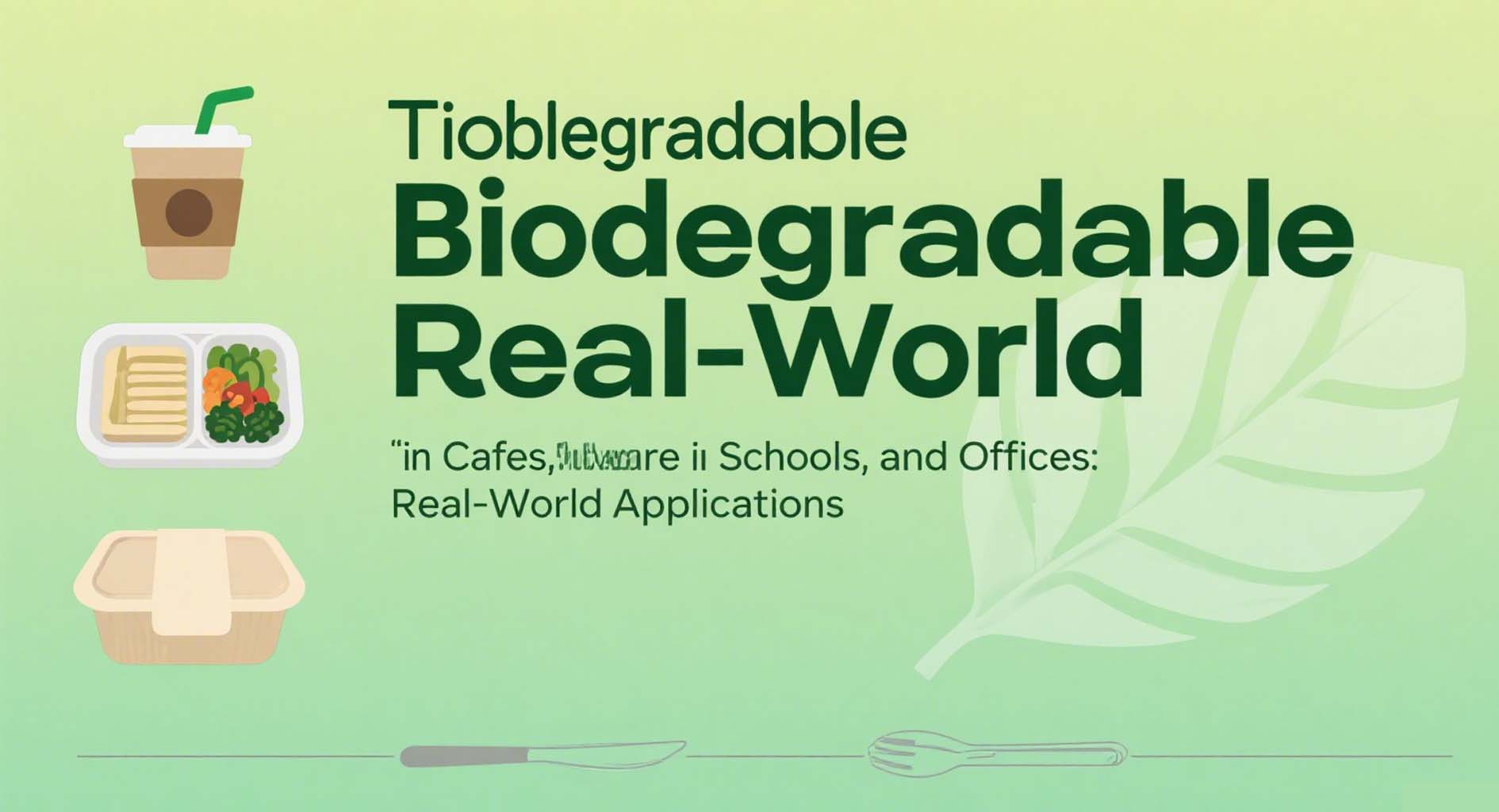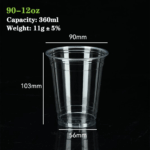Quick Summary
DASHAN’s biodegradable tableware, made from corn starch and sugarcane bagasse, provides eco-friendly alternatives for cafes, schools, and offices. These products are fully compostable, heat- and cold-resistant, durable, and customizable for branding. Real-world applications demonstrate reduced plastic waste, enhanced sustainability image, and compliance with global plastic bans. Institutions adopting DASHAN products contribute to a circular economy while promoting environmental awareness.
1. Introduction
The global push toward sustainability has placed significant pressure on businesses and institutions to reduce plastic waste. Cafes, schools, and corporate offices are key venues where disposable tableware is used daily, contributing heavily to environmental pollution. Biodegradable alternatives, especially those made from corn starch and sugarcane bagasse, have emerged as practical and eco-friendly solutions.
DASHAN provides a comprehensive range of biodegradable tableware, including corn starch cups, bowls, plates, cutlery, takeaway boxes, hinged containers, salad boxes, as well as sugarcane bagasse trays, bowls, plates, hinged boxes, and takeaway boxes. These products are designed to combine durability, heat resistance, and customizability with environmental responsibility, making them suitable for a wide variety of applications.
2. Overview of Biodegradable Tableware
Biodegradable tableware offers a sustainable alternative to traditional plastics, helping businesses and institutions reduce their environmental footprint while maintaining convenience and functionality.
Materials and Product Range by DASHAN:
-
Corn Starch Products: Cups, bowls, plates, cutlery, hinged containers, takeaway boxes, and salad boxes. These items are suitable for hot and cold beverages, as well as a range of food items from solids to semi-solids.
-
Sugarcane Bagasse Products: Trays, bowls, plates, hinged boxes, and takeaway boxes. Bagasse is particularly strong and ideal for serving heavier food items, making it perfect for catering and delivery services.
Key Advantages:
-
Biodegradability: DASHAN products fully compost under proper conditions, breaking down naturally without leaving microplastics.
-
Heat and Cold Resistance: Corn starch cups and bagasse bowls maintain integrity under hot drinks, iced beverages, and small meals.
-
Lightweight and Durable: Products withstand stacking, transport, and handling without cracking or breaking.
-
Customizable Branding: Logo printing, color accents, and patterns are available to enhance brand identity while promoting sustainability.
DASHAN’s offerings provide institutions with a reliable solution to reduce plastic use while ensuring safe, functional, and attractive tableware.
3. Application in Cafes and Coffee Shops

Use Cases:
-
Hot beverages: coffee, tea, lattes, cappuccinos.
-
Cold beverages: iced coffee, smoothies, juices.
-
Small meals or desserts: pastries, puddings, fruit cups.
Advantages:
-
Enhances eco-friendly brand image, appealing to environmentally conscious customers.
-
Enables custom printing for brand recognition on cups and boxes.
-
Supports compliance with local plastic bans and environmental regulations.
Example:
A coffee chain implemented DASHAN corn starch cups and sugarcane bagasse trays for all takeaway orders. Annual plastic reduction exceeded 1 ton, and customer surveys showed a 20% increase in positive feedback regarding sustainability practices.
4. Application in Schools and Educational Institutions
Use Cases:
-
Student cafeterias and beverage stations.
-
School events: parties, sports days, campus fairs.
Advantages:
-
Non-toxic, BPA-free materials safe for children.
-
Reduces campus plastic waste and promotes sustainable habits.
-
Encourages environmental awareness among students through hands-on experience.
Example:
A primary school adopted DASHAN corn starch plates and sugarcane bagasse bowls for all meals. Compost bins were placed alongside, allowing students to learn proper disposal practices. Over one academic year, the school diverted more than 500 kg of plastic waste from landfills.
5. Application in Offices and Corporate Settings

Use Cases:
-
Employee cafeterias and coffee corners.
-
Meetings, corporate events, and training sessions.
Advantages:
-
Demonstrates corporate social responsibility (CSR) and environmental stewardship.
-
Reduces the volume of plastic waste, lowering disposal costs.
-
Promotes employee engagement with sustainability initiatives.
Example:
A multinational company switched to DASHAN corn starch takeaway boxes and sugarcane bagasse bowls in its office cafeterias. Employee adoption was high, and monthly plastic waste decreased by 35%, contributing to the company’s ESG targets.
6. Cross-Scenario Analysis
-
Material Comparison: Corn starch is lightweight and ideal for liquids, while bagasse offers sturdier options for solid food items.
-
Cost vs. Benefit: Slightly higher upfront costs are offset by reduced waste management expenses and enhanced brand image.
-
Environmental Impact: Both materials are compostable, reducing landfill contributions and avoiding microplastic pollution.
7. Strategies to Promote Sustainable Practices
Promoting sustainable practices in foodservice and institutional environments requires a multi-faceted approach, combining product innovation, operational changes, consumer education, and policy alignment. For institutions adopting biodegradable tableware, such as DASHAN’s corn starch and bagasse products, several strategies can maximize environmental impact:
7.1 Product Substitution and Standardization
Replacing conventional single-use plastics with biodegradable alternatives is the first step. DASHAN offers a wide range of products, including cups, hinged takeaway boxes, bowls, salad containers, trays, plates, and cutlery, which can be standardized across cafes, schools, and office cafeterias. Standardizing biodegradable tableware not only simplifies procurement and logistics but also reinforces a consistent sustainability message to consumers and staff.
7.2 Integration into Daily Operations
Sustainable practices must be embedded into daily workflows. Cafes can adopt DASHAN corn starch cups and hinged boxes for takeaway drinks and meals, reducing plastic waste at the source. Schools and offices can implement tray and plate systems made from bagasse, which are suitable for hot and cold foods. Clear labeling and designated disposal stations for compostable items help ensure proper end-of-life treatment.
7.3 Consumer and Staff Education
Awareness campaigns are crucial for achieving behavioral change. Educational signage, social media posts, and workshops can communicate the environmental benefits of switching to biodegradable tableware. For example, offices can provide staff with tips on composting used cups and trays, while cafes can highlight the renewable nature of corn starch and sugarcane bagasse in marketing materials. Educated consumers are more likely to support sustainable initiatives and adopt eco-conscious habits.
7.4 Incentive Programs
Offering incentives encourages adoption and reinforces sustainable behavior. Cafes might introduce discounts for customers who choose biodegradable packaging or bring reusable containers, while schools and offices could organize competitions or recognition programs for teams that minimize plastic waste. By rewarding sustainable choices, institutions create positive reinforcement loops that increase compliance and enthusiasm.
7.5 Collaboration with Suppliers and Partners
Partnerships with suppliers like DASHAN ensure access to high-quality, certified biodegradable products. Collaboration also enables institutions to co-develop custom printed products, aligning with branding while promoting sustainability. Bulk ordering and long-term contracts can reduce cost and environmental impact from transportation, packaging, and storage.
7.6 Monitoring and Reporting
Tracking usage and waste reduction is essential to measure the success of sustainable initiatives. Cafes and offices can quantify the volume of plastic avoided by switching to biodegradable tableware, while schools can integrate sustainability metrics into annual reports. Transparent reporting motivates staff and consumers while providing valuable data for continuous improvement.
7.7 Policy and Community Engagement
Institutions can strengthen sustainability efforts by aligning with local and national policies, such as single-use plastic bans. Additionally, engaging the broader community—through workshops, eco-awareness events, or partnerships with local composting facilities—extends the impact of sustainable practices beyond individual institutions, fostering a culture of environmental responsibility.
7.8 Continuous Innovation
Finally, sustainable practices require constant adaptation. Institutions should stay informed about emerging materials, certifications, and eco-friendly packaging technologies, including next-generation bioplastics, PLA alternatives, or hybrid products. Regularly updating tableware selections ensures that operations remain at the forefront of sustainability and maximize environmental benefits.
FAQ
Q1: What materials are DASHAN biodegradable tableware made from?
A1: DASHAN tableware is made from corn starch and sugarcane bagasse, both renewable, biodegradable, and safe for food contact.
Q2: Are these products suitable for hot and cold beverages?
A2: Yes, corn starch cups and bagasse bowls are heat- and cold-resistant, maintaining structural integrity for various beverages.
Q3: Can DASHAN tableware be composted?
A3: Yes, these products are fully compostable under industrial or home composting conditions, leaving no microplastics.
Q4: Are DASHAN products safe for children and schools?
A4: Yes, all materials are non-toxic, BPA-free, and compliant with international food safety standards.
Q5: Can the tableware be customized for branding?
A5: Yes, DASHAN offers custom printing for logos, patterns, and colors, ideal for cafes, schools, and offices.
Q6: How do these products help institutions reduce plastic waste?
A6: By replacing single-use plastic cups, plates, and trays with biodegradable alternatives, institutions lower landfill contributions and support sustainability goals.
Q7: Where are DASHAN products most commonly used?
A7: They are widely used in cafes, coffee shops, schools, offices, corporate events, and catering services.
Conclusion
Biodegradable tableware offers a practical, safe, and environmentally responsible alternative to traditional plastic products. Cafes, schools, and offices can leverage DASHAN’s corn starch and sugarcane bagasse products to reduce plastic use, promote sustainability, and enhance operational efficiency. By adopting these materials, institutions contribute to a circular economy, foster eco-conscious behavior, and align with global regulatory trends aimed at curbing plastic pollution.
References
-
China Ministry of Ecology and Environment – Plastic Restriction Policies
-
Packaging Europe – Sustainable Foodservice Packaging
Copyright Statement
© 2025 Dashan Packing. All rights reserved.
This article is an original work created by the Dashan Packing editorial team.
All text, data, and images are the result of our independent research, industry experience,
and product development insights. Reproduction or redistribution of any part of this content
without written permission is strictly prohibited.
Dashan Packing is committed to providing accurate, evidence-based information and
to upholding transparency, originality, and compliance with global intellectual property standards.






